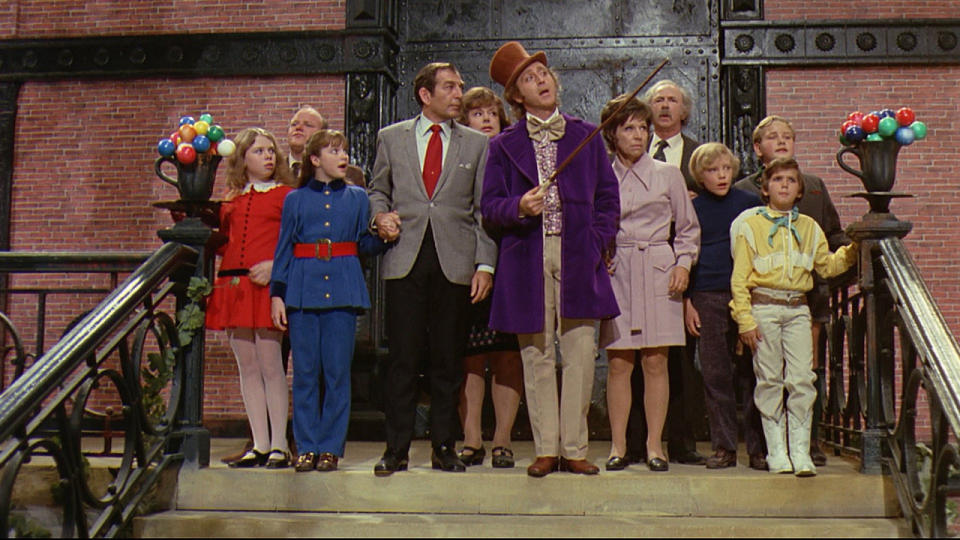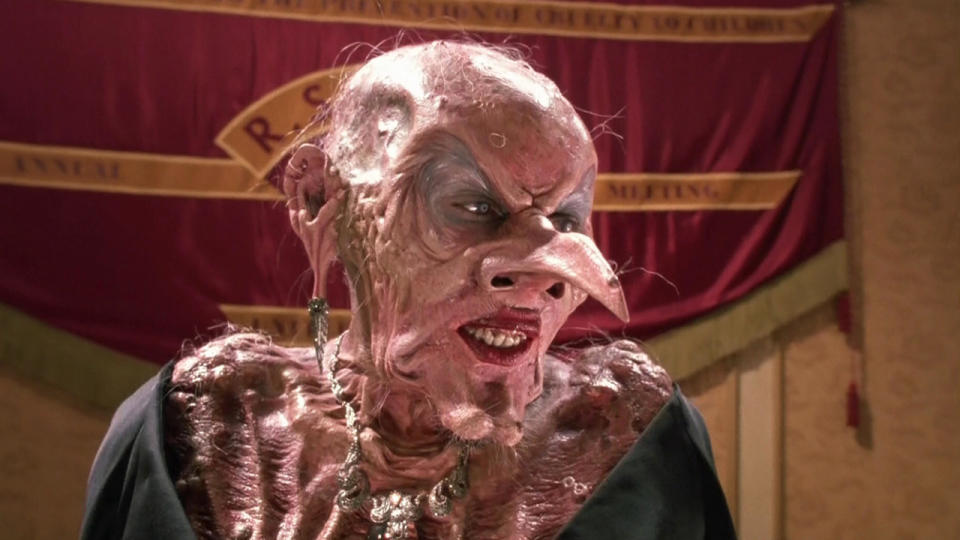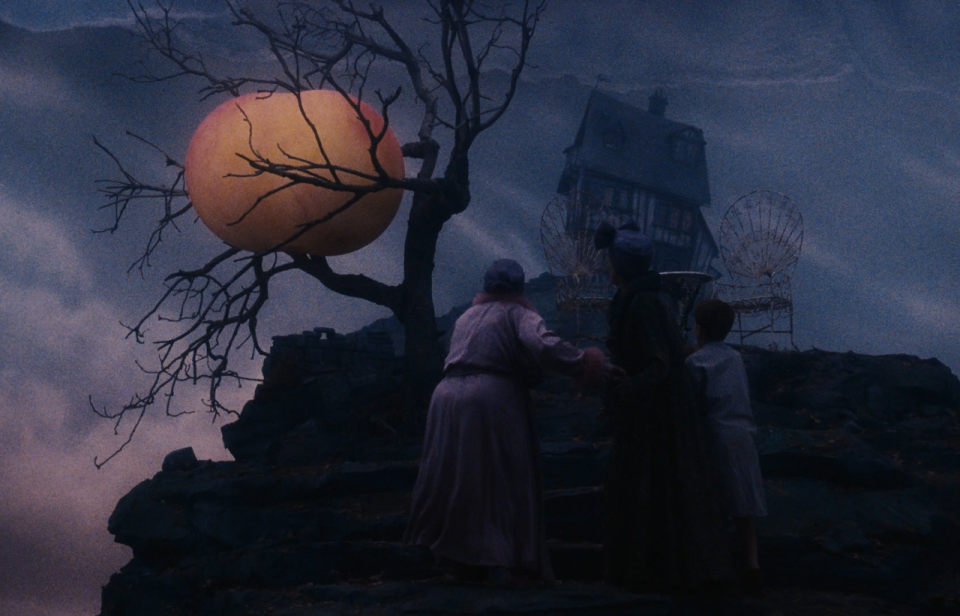The Roald Dahl Movies Which Came Before The BFG

The stateside commercial failure of Steven Spielberg’s ‘The BFG’ has sent shockwaves through film fandom. Still, as disheartening as the news may be to admirers of Roald Dahl, in some respects it isn’t too surprising, as the source novel - and, perhaps more significantly, its author - isn’t perhaps as well-loved in the US as elsewhere, and certainly isn’t as attuned to American sensibilities.
Of course, here in the UK it’s a different story. Generations of British readers have known Dahl as one of the finest writers of children’s books the world has even seen. His work was wildly imaginative, infectiously anarchic with darkly comedic overtones which surprise and delight young and old alike, to this day.
Still, while Dahl may not have been as warmly embraced on the other side of the Atlantic, this hasn’t stopped more than a few of his seventeen children’s books being adapted for the big screen. As we await the UK release of 'The BFG,’ what better time to look back on the existing Dahl movies, and consider how well they captured the spirit of the timeless storyteller?
Note: 1989’s 'Danny, the Champion of the World,’ the animated version on 'The BFG,’ and 2014’s 'Esio Trot’ have not been included, as these were made for television.

Willy Wonka and the Chocolate Factory (1971)
This wasn’t strictly speaking the first Roald Dahl movie: his short story 'Beware of the Dog’ was adapted into 1965’s '36 Hours’ starring James Garner, and Dahl himself famously scripted the Bond movie 'You Only Live Twice’ and another Ian Fleming adaptation, 'Chitty Chitty Bang Bang.’
However, 'Willy Wonka and the Chocolate Factory,’ the first adaptation of arguably Dahl’s best-loved book 'Charlie and the Chocolate Factory,’ remains one of, if not the most highly regarded Dahl adaptation - even if the author himself was dissatisfied with the film (more on which here.)
This is a shame, as the film does a great job evoking a sense of timeless wonder reminiscent of the novel, without diluting the sinister undertones, as the eccentric chocolatier Wonka invites the five lucky Golden Ticket winners for an exclusive tour of his factory - only to gradually weed out the nastier ones who don’t deserve their spot in his sugar-coated nirvana.
Mel Stuart’s direction is a bit flat at times, and the odd blending of American and British sensibilities often feels a bit awkward, but Wilder proves a compelling Master of Ceremonies (even if Dahl disapproved of his casting). And who can forget such wonderful musical numbers as The Candy Man Can, Pure Imagination, and the Oompa Loompa song?

The Witches (1990)
Dahl’s intense dissatisfaction with 'Willy Wonka and the Chocolate Factory’ saw the author hold his work in something of an iron grip in the decades ahead - until 'The Witches.’ Given that it’s one of Dahl’s most sinister children’s stories, and is directed by Nicolas Roeg (more accustomed to such adults-only fare as 'Don’t Look Now’ and 'The Man Who Fell To Earth’), it’s no wonder the film pushes the boundaries of what might be classed as family friendly, hence it routinely pops up on lists of the scariest kids’ films ever.
A pre-'Addams Family’ Anjelica Huston is inspired casting as the Grand High Witch; her performance hits a subtle note between arch camp and outright terror. While she may be sinister enough in herself, the reveal of her true face is a real nightmare-inducer, but also a truly remarkable make-up job.
Still, in other respects The Witches is a bit of a mess. FX sequences aside it’s pretty cheap-looking, and Jasen Fisher is rather too cutesy as Luke; it’s also rather grating that the main child was made American in an otherwise largely British production. Most controversial, though, was the decision to replace the book’s tragic yet bittersweet conclusion with a more conventional happy ending. This, by all accounts, was the straw that broke the camel’s back for Dahl, who reportedly had to be talked down from taking his name off the film.
Still, we may yet get to see something close to Dahl’s vision, as Guillermo del Toro has long spoken of his hope to remake 'The Witches,’ although little has been heard on the subject for a while.

James and the Giant Peach (1996)
Having broken through as director of ‘The Nightmare Before Christmas,’ Henry Selick sought to step out of Tim Burton’s shadow (though Burton still produced) with this live-action and stop-motion animation crossover based on Dahl’s very first children’s book from 1961. The results are agreeable enough, but too slight to have much impact.
Paul Terry portrays James, the young boy whose happy life is plunged into tragedy when his parents are killed by a rhino, and he is sent to life in an old house on a hill with his cruel and neglectful aunts, Miriam Margoyles and Joanna Lumley. However, James soon finds means of escape via a giant peach which magically grows in the garden, and makes friends with the overgrown insects who live inside (voiced by Susan Sarandon and Richard Dreyfuss, among others).
While there’s a technical crudity to the live-action sequences which book-end the animated action, this semi-theatrical approach in some ways makes ‘James and the Giant Peach’ more like a fairy tale than any other Dahl adaptation; and given that Dahl reportedly hated how frighteningly realistic ‘The Witches’ got, we can but hope he would approve of Selick’s approach.
Even so, it’s a very insubstantial story which feels drawn out even at only 75 minutes, and it does get a little sickly sweet at times. This isn’t helped by Randy Newman’s score and songs, which feel a little too upbeat given the sinister elements.

Matilda (1996)
As we’ve seen, the transatlantic nature of the previous Dahl adaptations proved something of an obstacle to conveying the author’s distinct tone. As such, it comes as a pleasant surprise that one of the most faithful and effective Dahl films is also one of the most Americanised.
‘Matilda’ is directed by Danny DeVito (who also stars as Mr. Wormwood), and it plays out closer to the original novel than arguably any other Dahl movie, even with the action being shifted from Britain to the US (with minor embellishments, including a pair of FBI agents investigating Matilda’s father). While the locations change, the story remains intact, as a family of ignorant slobs somehow give birth to a remarkable child prodigy, whose gifts turn out to go far beyond academic prowess, into the realm of the paranormal.
The key consideration here is that, while it may be American, ‘Matilda’ doesn’t get saccharine. DeVito (who has directed his fair share of black comedies, such as ‘Throw Momma From The Train’ and ‘The War of the Roses’) is well attuned to Dahl’s macabre nature, and finds that same joy in the grotesque. And they don’t come much more grotesque than diabolical headmistress Miss Trunchbull, played to perfection by Pam Ferris (who, wisely, was allowed to play the role as English).
Of course, the real star of the show is Mara Wilson in the title role. The child actress famously retired from film after only a few roles, but this is as fine a performance to be remembered by as any actor could hope for.

Charlie and the Chocolate Factory (2005)
Dahl’s dissatisfaction with ‘Willy Wonka and the Chocolate Factory’ saw him forbid any remakes in his own lifetime. However, his estate trusted Tim Burton to do justice to ‘Charlie and the Chocolate Factory’ some 34 years later - but while the film is not without its strengths, all in all it’s far more trick than treat.
On the plus side, no one could have asked for a better Charlie than Freddie Highmore. The intensely charismatic young actor is an absolutely captivating central presence throughout the first act, beautifully balancing childish innocence with a sense of wisdom beyond his years.
This, however, all goes out the window once Johnny Depp’s Willy Wonka appears, and from that point on no other character gets a word in edgeways. Worse yet is that Depp’s interpretation of the role is so off; Wonka is meant to be a figure of wonder, someone the children want to be around and aspire to be like, even with his sinister undertones. Depp’s Wonka, however, is nothing but sinister; a socially inept agoraphobe who the children seem deeply uncomfortable around. Likewise, the factory which is meant to be awe-inspiring and extraordinary just looks creepy and uninviting.
The new subplot involving Wonka’s father (Christopher Lee) feels extraneous, and even more off-putting to British ears are the Americanisms of John August’s script; why, when ‘chocolate’ is in the title itself, must everyone – British characters included – always call it ‘candy?’

Fantastic Mr Fox (2009)
The films of director Wes Anderson have always been something of an acquired taste. The idea of him making a film for a family audience was certainly unexpected; although it wasn’t unprecedented, with fellow hipster ‘dramedy’ filmmaker Spike Jonze having filmed Maurice Sendak’s ‘Where the Wild Things Are’ around the same time.
Happily, like Danny DeVito before him, Anderson proves able to Americanise Dahl without diluting or declawing the text. It doesn’t hurt that he brings with him a highly respectable big name cast to voice the ensemble of outlaw animals which go head-to-head with a trio of greedy farmers.
George Clooney heads up the cast as Mr Fox himself, with Meryl Streep as Mrs Fox, Willem Defoe as Rat, Michael Gambon as the villainous Farmer Bean, and Anderson regulars Jason Schwartzman and Bill Murray in supporting roles. ‘Fantastic Mr Fox’ also proves successful in having a spirit of its own as a stop-motion animated film. Henry Selick had initially been set to co-direct before dropping out to make ‘Coraline,’ but the final film does not at all feel derivative of the stop-motion master’s work.
The film expands on the short narrative of the novel in a manner which feels in-keeping with Anderson’s work, yet doesn’t betray the spirit of Dahl. There is, however, a larger question mark over whether or not the film will hold the attention of younger viewers accustomed to less understated and verbose entertainment.
Picture Credit: Warner Bros, Disney, Sony, 20th Century Fox
Read More:
Why Roald Dahl Hated Willy Wonka
The BFG Bombs In The US
Macauley Culkin Stars In Compare The Meerkat Ads

 Yahoo Movies
Yahoo Movies 
